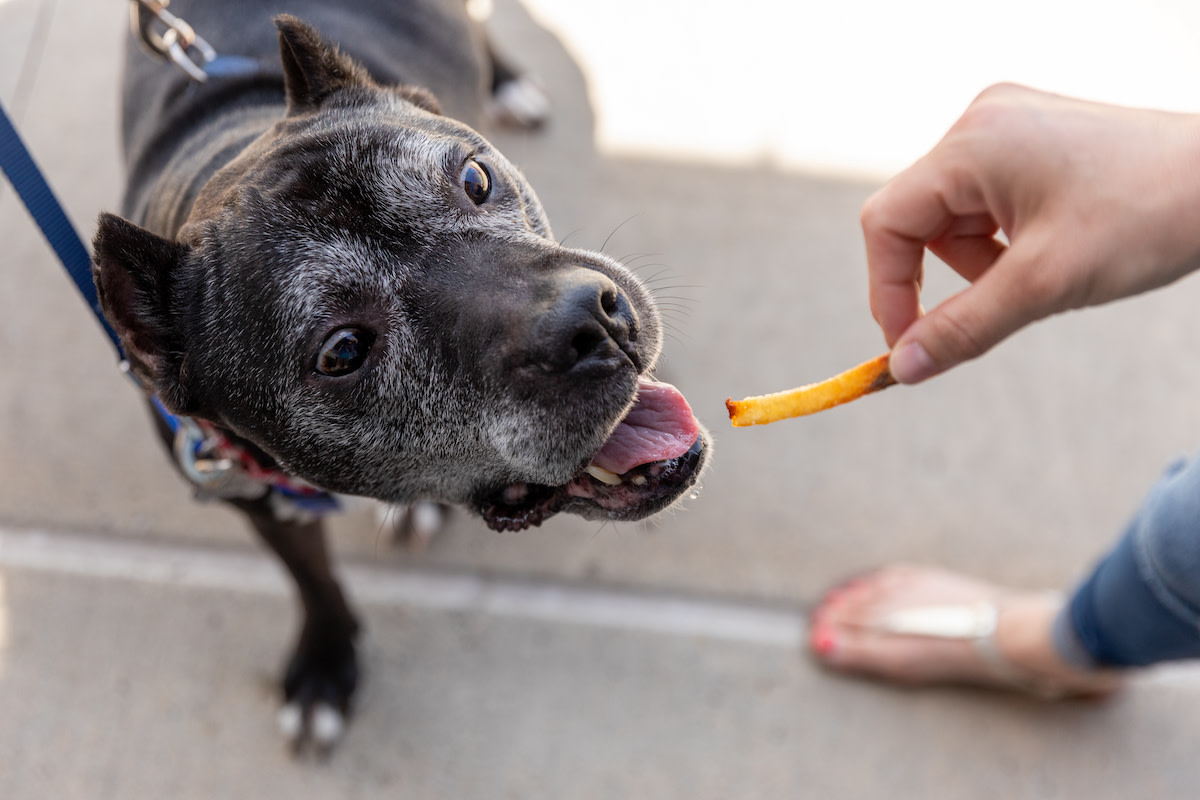To the delight of dog owners everywhere, tiny portions of the human snack known as french fries are not hazardous to dogs. This beloved human snack, however, is still a high-fat junk meal that you shouldn’t serve to your pet, even sometimes.

French Fries: Safe for Dogs to Eat?
There is little risk that your dog will get sick by eating a few french fries from your plate. This human food has a little nutritional benefit for your dog and might cause health problems if consumed in large quantities. Overfeeding your dog on French fries may cause weight gain because of the high levels of salt, fat, and carbohydrates.
Dogs shouldn’t eat fries from restaurants or fast food chains due of the excessive salt content. Fries from restaurants are typically seasoned with ingredients that are toxic to dogs, such as garlic or onion powder.
If you want to treat your dog, don’t offer it french fries; instead, try giving it a healthier human meal like blueberries, lentils, or vegetables. Healthy dog treats might be a great alternative for catering to your dog’s individual requirements. Keep in mind that your dog needs very few servings of dog food to meet its caloric needs.
French fries pose five risks if given to your dog
Some of the issues that might arise from giving your dog french fries are listed below.
- Allergic reactions: certain dogs may have an allergic response to either raw or cooked potatoes. (On the other hand, cooked sweet potatoes are OK to give to your dog.) If your dog accidently consumes potatoes, look out for signs of an allergic response (such as hives or swelling).
- There is a danger of salt poisoning (which may be deadly) in tiny dog breeds if they consume too many French fries because of the high salt content. Dehydration, increased thirst, hypertension, and increased urination are all possible side effects of even a little increase in your dog’s typical salt intake. Ketchup, for example, has a lot of salt and sugar, both of which are bad for your dog.
- A dog’s stomach might become upset by the canola or vegetable oil used to fry french fries since it contains harmful saturated and trans fats. Your dog’s health is at risk from both the acute effects of bloat and the chronic effects of pancreatitis if it consumes these toxic fats, even in little amounts.
- Gastrointestinal distress: Just as with humans, a dog’s digestive system reacts negatively to high-carb fried food.
Fat gain: If you give your dog a high-carbohydrate, high-fat diet on a regular basis, such french fries, they are more likely to gain weight. Serve your dog a diet of high-quality dog food that has been approved by your doctor to help them stay at a healthy weight.
Doggy French Fry Poisoning: What to Do
It’s probably safe to feed your dog a few french fries. But if your dog eats a whole huge order of fast food fries, you should be cautious.
- As a first step, you should give your dog something to drink. If your dog has eaten too many french fries, make sure they have access to lots of water. They’ll be parched from the extra salt, but drinking water will keep them from passing out.
- Make sure you keep an eye out for any signs of nausea or vomiting. Overeating canine fries usually results in gastrointestinal distress, diarrhoea, and vomiting. A more serious health concern is canine bloat, which manifests with dry heaving, heavy drooling, fast breathing, nervous pacing, and stomach discomfort and swelling.
- To prevent salt poisoning, observe for symptoms. Extreme thirst and urine are the most noticeable symptoms of salt toxicity in dogs. Even so, your dog may also endure spasms or convulsions, weakness, nausea, a swollen tongue, and trouble walking. Get in touch with a vet ASAP if you see any of these symptoms.
- Keep an eye out for symptoms of allergies. Breathing problems, hives, rashes, and itching are all signs of a potato allergy.
Please contact your local animal hospital immediately. Call your vet immediately if you see any of the aforementioned symptoms in your dog.
Remember Your Dog Won’t Eat That!
Always check with your vet to see whether adding any new foods to your dog’s diet, especially if they are from the human food group, since some of them might trigger allergic responses in dogs. This page should not be used as a replacement for professional medical or nutritional advice; instead, it should be used as a supplementary resource.